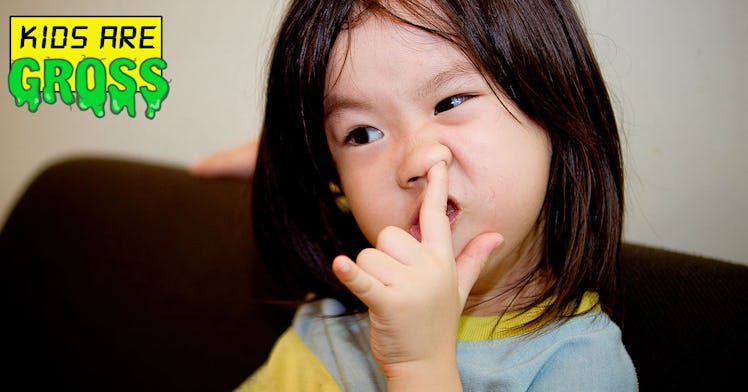Why Parents Don’t Find Objectively Disgusting Kids Gross
Your friends' kids are absolutely vile. Your kid isn't. There's a reason for that.

The thought of changing a dirty diaper or wiping dribble from a baby’s chin once made me gag. Now, two kids (and reams of urine, vomit, and feces) later, I am nearly immune. I do not find my own kids disgusting, at least not unless they do something extraordinarily gross. The mundane routine of handling their excrement is about as intimidating as reading a bedtime story.
But this only applies to my kids. Your kids are disgusting.
I’m not alone in this assessment. Studies have shown that mothers literally think their children’s shit doesn’t stink, yet still find other babies’ diapers revolting. Why? “There’s no universally agreed-upon answer,” Laith Al-Shawaf, a professor of psychology who studies the emotion of disgust at the University of Colorado, Colorado Springs, told Fatherly. But he has some theories. “We need to be able to down-regulate disgust in order to take care of key life events — care for our kids, clean wounds, change their diapers, et cetera,” Al-Shawaf says. “Our brains down-regulate disgust, when needed, in order to help us accomplish the tasks we need to accomplish.”
Scientists disagree about the exact origins of disgust. Some, like Al-Shawaf, maintain that if we are hardwired to experience disgust—an evolutionary boon that keeps us far away from sources of infection. “Feces, food, and garbage—all involve pathogen vectors and the risk of disease,” he says. “When we feel disgust, many things take place at once to reduce the risk of infection. Attention narrows in order to help us focus on the pathogenic stimulus, our immune responses are activated, sexual arousal becomes more difficult to achieve, we engage in avoidant motor behaviors, and people report feeling less extraverted and less open to new experiences.”
Others argue that the disgust response is more a matter of nurture than nature. As we grow up, we watch those around us react with repulsion to certain stimuli and our cultural knowledge of what should disgust us accumulates. “I think it’s a cultural thing,” says Paul Rozin, psychology professor at the University of Pennsylvania and pioneer of disgust research.
“You have this category of disgust, from early on in life, and other things are accreted to it. People make the same expressions and react to certain things in the same way. This is how Nazis get to be disgusting.” Rozin also raises the possibility that disgust stems from our own discomfort with the realization that we, too, are animals. “It is the features we share with animals that are disgusting,” he says. “Viscera, blood. We’re offended by this. The most important feature we share with animals is death. And the odor of death is the odor of decay.”
Whether biologically hardwired or culturally acquired, researchers agree that we are capable of down-regulating our disgust response when necessary. We generally do not find our own bodily functions repulsive, and this may explain why we don’t consider our children all that gross, either. “People don’t find their own shit as disgusting as other people’s shit,” Rozin says. “People live with the spit in their mouths and the urine in their bladders. You get accustomed to your own disgusting substances and kids become part of yourself.” Besides, our own bodies and the bodies of our children present comparatively less risk of disease. “Other people’s bodies introduce novel pathogens that our immune systems aren’t trained to handle,” Al-Shawaf says. “In fact, there’s research suggesting that one reason humans are xenophobic is that people from other cultures carry very different pathogens than those from our local culture.”
Aside from handling explosive diapers and tolerating our own flatulence, we tend to turn off our disgust responses for sex, too. “Sexual intimacy usually doesn’t involve disgust,” Al-Shawaf says. “But imagine how disgusting it would be to swap saliva with someone you aren’t sexually or romantically attracted to.” Rozin suspects the transgressive nature of engaging in disgusting behavior with a loved one may even be part of the allure. “I would claim — though it has not been shown — that there’s something enhancing about putting up with someone you love, their saliva.”
Of course, disgust is merely down-regulated when it comes to our children, our lovers, and ourselves. We are still capable of gagging. “When you shit your pants — that’s too much,” Rozin says. “People like the burn of a chili pepper, which is negative, but too much burn they do not like.” Even when we are grossed out by our own flesh and blood, however, the average disgust response tends to be muted. “This on-average difference is real,” Al-Shawaf says. “Even if we occasionally feel disgust at our own bodies or our kids.”
Besides, we still need to experience some disgust. If we never felt disgust about our own bodies, we wouldn’t be motivated to clean ourselves or take care of our wounds. If we didn’t find our kids at least somewhat disgusting, we wouldn’t prevent them from digging through garbage and engaging in unhealthy behaviors. “Disgust can’t disappear entirely,” Al-Shawaf says. “We still need it to protect ourselves and our families from infectious disease. If we felt no disgust at all about our own bodies and our kids’ bodies, we would be in dangerous territory.”
“That’s the beautiful thing about disgust,” he adds. “It may feel aversive, but it evolved for a reason and it serves an important function in our lives.”
This article was originally published on